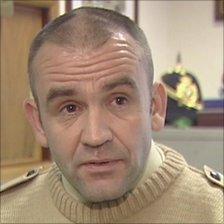Mercian soldiers trained to identify early trauma signs
- Published
Soldiers from the East Midlands are being trained to help comrades traumatised by war.
Commanders from the Mercian regiment's second battalion will be monitoring men for signs of battlefield stress when they return to Afghanistan.
Regimental Sergeant Major Pete Lewis, from Carlton in Nottingham, is running the new Trauma Risk Incident Management (Trim) programme.
The regiment is due to start its fourth tour in Helmand Province this year.
RSM Lewis explained the Trim programme, which involves assessing everyone caught up in battles or explosions to see if they are at risk of developing Post-Traumatic Stress Disorder (PTSD).
"It's a sanity check. It gets in at ground level and stops a lot of problems straight away.
"If their patterns change after the incident or they can't sleep or are having trouble eating, all these things are identified and an informal Trim session brings it all out."

RSM Pete Lewis believes early intervention can prevent post-traumatic stress developing
He added: "If they still persist they get sent to the relevant agencies in the Ministry of Defence - the stigma of it is not there any more."
Panic attacks
L/Cpl Johnno Lee, from Newark, was blown into a minefield by a Taliban bomb and lost so much blood his heart stopped twice.
His injuries were so severe he lost his right leg, but he says the psychological trauma has been harder to deal with.
"My nightmare is that I'm still back there and I never left and all this is a dream.
"My main problem is not my leg but my panic attacks and nightmares and not being able to sleep. It feels like when you are having a dream and you are trying to scream and shout out but you can't.
"You wake up sweating and your bed's wet through with sweat."
Physical symptoms
Soldiers are undergoing training in the Trim programme now ahead of a return to Helmand in the autumn.
Symptoms of PTSD usually start within six months, and sometimes only a few weeks after the trauma.
Sufferers can feel grief-stricken, depressed, anxious, guilty and angry.
They may also have flashbacks and nightmares, be "on guard" - staying alert all the time, anxious and experience sleep deprivation.
Physical symptoms can include aches and pains, diarrhoea, irregular heartbeats, headaches, feelings of panic and fear and depression.
- Published20 October 2010